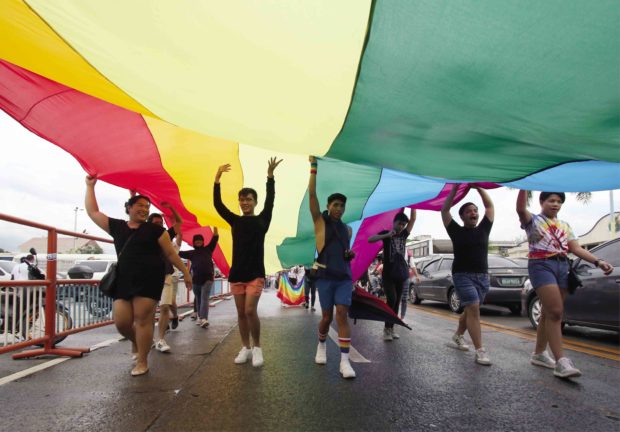Reclaiming safe spaces for the LGBTQIA+ community
Pre-colonial Philippines has always fascinated me because of its colorful cultural practices, interesting language, and fantastical myths. As a queer development communicator, my favorite figure has always been the babaylan, the Filipino version of a shaman, known as a healer, diviner, and priestess in Philippine indigenous communities.
The babaylan is typically a woman who is well-respected in the community because of her ability to bridge the human and supernatural worlds. However, historical accounts showed that there were also male babaylan who crossed genders, making them symbolic icons for the Philippine LGBTQIA+ (lesbian, gay, bisexual, transgender, queer or questioning, intersex, asexual, aromantic, or agender) movement.
The indigenous practice of having a babaylan did not last long during the Spanish colonization, as the colonizers found this powerful class of Filipinos a threat. But the end of their era did not at all dim the vibrant movement of the LGBTQIA+ community that we know today.
However, from being well-respected babaylans in pre-colonial society, many members of the LGBTQIA+ community now face different forms of gender-based violence and discrimination.
While Filipino queers have a long-standing history in the country, there remains the glaring absence of national legislation to protect them.
Living in fear
I still remember how devastating it was for the Filipino transgender community, when at the start of the year 2021, three transgenders were brutally killed, three trans-feminine sisters were kidnapped while a transgender woman was denied teaching opportunities.
Today, the LGBTQIA+ community faces alarming rates of gender-based violence and discrimination. From 2010 to 2020, at least 50 transgender or non-binary Filipinos were murdered.
Studies showed that around half of transgender people and bisexual women would experience sexual violence during their lifetime.
Another display of violence towards the LGBTQIA+ community are micro-aggressions.
Micro-aggressions are indirect or subtle acts of discrimination against marginalized groups in their daily lives. It often manifests through conscious or unconscious discriminatory or transphobic remarks against the LGBTQIA+ people.
Gender-fair language matters
Since I started joining feminist and queer rights organizations, I became more careful with my words. Even as a queer person myself, I admit that my statements may come off as a form of micro-aggression against my own community.
This self-awareness led me to appreciate our Filipino language, which is believed to be largely gender-neutral. One example is the pronoun “siya,” which refers to a person. There are also no direct translations to the words husband or wife in the Filipino language as we use the term “asawa,” referring to the gender-neutral spouse.
But despite this realization of gender neutrality in language, we are still confronted by different discriminatory experiences in public and private spaces.
Anti-discrimination policies
While the country ranked as the 10th most gay-friendly country in a 2013 global survey by Pew Research Center, the LGBTQIA+ community is still at risk because of the absence of a national law that will protect them from discrimination and hate crimes.
The first bill seeking to end gender-based discrimination was first filed in the Philippine Congress in 2000. More than 20 years later, the anti-discrimination bill, also called the SOGIE (Sexual Orientation, and Gender Identity and Expression) Equality Bill, has yet to overcome opposition from various groups and become law.
However, there are positive developments at the local level. So far, 30 municipal and provincial governments have already passed anti-discrimination ordinances to end gender-based violence and abuse. But these are not enough as these local legislations could only protect around 25 percent of the population.
Reclaiming safe spaces
We need more allies to fully recognize the rights of the LGBTQIA+ community amid the compounding challenges of the global economic recession, shrinking democratic spaces, and disinformation.
The Philippine Anti-Discrimination Alliance of Youth Leaders (PANTAY) is at the frontlines of the LGBTQIA+ movement in the country rallying for gender-inclusive and responsive legislation at the local and national levels. With its wide network of activists and advocates all over the Philippines, it helped pass local ordinances through lobbying campaigns and progressive programs.
Oxfam Pilipinas, together with its partner organizations, is also advocating for gender justice by supporting programs and policies that address the elimination of violence against women, girls and people with diverse SOGIE.
It takes a village to fully realize the liberation of the LGBTQIA+ and end the cycle of gender-based violence against its members. To genuinely recognize that LGBTQIA+ rights are human rights requires the passage of a gender recognition law, and a hate crime law, and achieving marriage equality, social protection, and many more. It is with the hope that the young and vibrant movement of LGBTQIA+ will make this happen.
From the babaylan to the modern queer icons and individuals of today, equality and freedom are deeply rooted in our Filipino values. We will therefore reclaim our rightful spaces and ensure that we are all equal and free from all forms of discrimination and violence.
(Cheng Pagulayan is a queer climate activist, development communicator, licensed environmental planner, and gender justice advocate. Currently, he is the advocacy officer for climate change and energy transition of Oxfam Pilipinas and the director for policy and campaigns of the Philippine Anti-Discrimination Alliance of Youth Leaders)
TSB





















